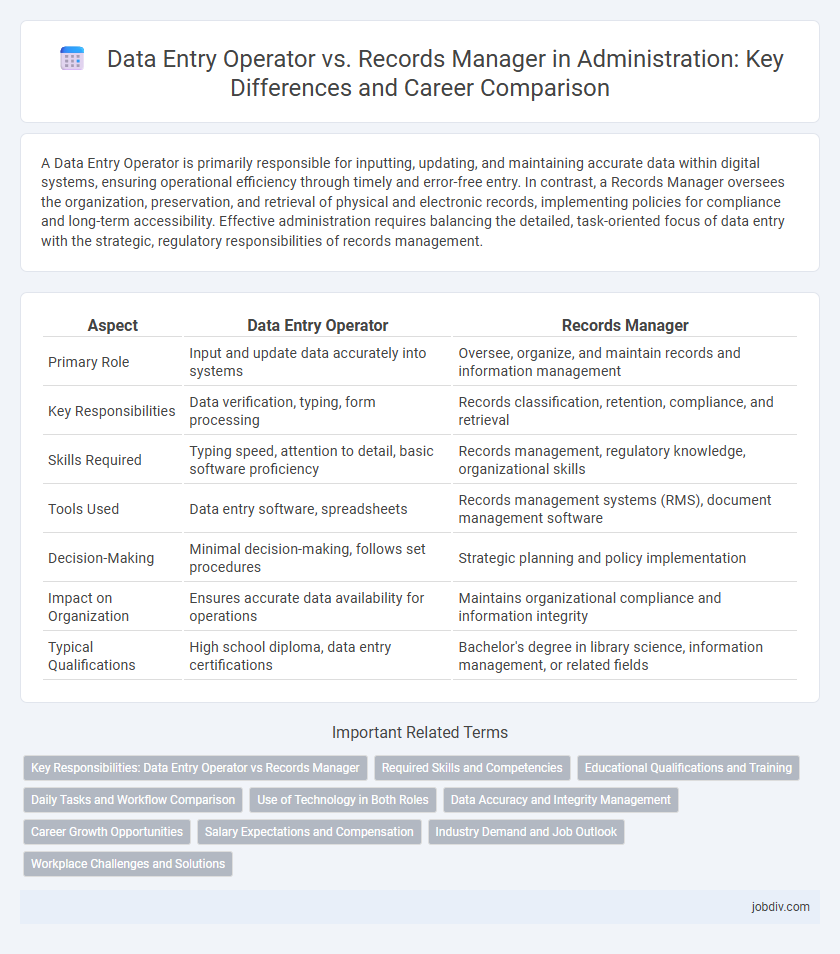A Data Entry Operator is primarily responsible for inputting, updating, and maintaining accurate data within digital systems, ensuring operational efficiency through timely and error-free entry. In contrast, a Records Manager oversees the organization, preservation, and retrieval of physical and electronic records, implementing policies for compliance and long-term accessibility. Effective administration requires balancing the detailed, task-oriented focus of data entry with the strategic, regulatory responsibilities of records management.
Table of Comparison
| Aspect | Data Entry Operator | Records Manager |
|---|---|---|
| Primary Role | Input and update data accurately into systems | Oversee, organize, and maintain records and information management |
| Key Responsibilities | Data verification, typing, form processing | Records classification, retention, compliance, and retrieval |
| Skills Required | Typing speed, attention to detail, basic software proficiency | Records management, regulatory knowledge, organizational skills |
| Tools Used | Data entry software, spreadsheets | Records management systems (RMS), document management software |
| Decision-Making | Minimal decision-making, follows set procedures | Strategic planning and policy implementation |
| Impact on Organization | Ensures accurate data availability for operations | Maintains organizational compliance and information integrity |
| Typical Qualifications | High school diploma, data entry certifications | Bachelor's degree in library science, information management, or related fields |
Key Responsibilities: Data Entry Operator vs Records Manager
Data Entry Operators are primarily responsible for accurately inputting, updating, and maintaining information in digital databases, ensuring error-free and timely data processing. Records Managers oversee the systematic organization, storage, retrieval, and protection of physical and digital records, implementing retention policies to comply with legal and regulatory requirements. While Data Entry Operators focus on data accuracy and speed, Records Managers emphasize record lifecycle management, security, and compliance.
Required Skills and Competencies
Data Entry Operators require strong typing speed, accuracy, and familiarity with data management software, emphasizing attention to detail and basic database knowledge. Records Managers need advanced organizational skills, expertise in information governance, compliance regulations, and proficiency in records management systems for effective data lifecycle management. Both roles benefit from strong communication skills and a solid understanding of data confidentiality and security protocols.
Educational Qualifications and Training
Data Entry Operators typically require a high school diploma or equivalent, with training focused on typing speed, accuracy, and familiarity with data management software. Records Managers usually hold a bachelor's degree in Library Science, Information Management, or a related field, accompanied by specialized training in records retention policies, compliance standards, and digital archiving systems. Advanced certifications like Certified Records Manager (CRM) enhance qualifications and demonstrate expertise in managing organizational data assets.
Daily Tasks and Workflow Comparison
Data Entry Operators primarily focus on accurately inputting, updating, and maintaining digital records through various software platforms, ensuring data integrity and timely entry to support organizational operations. Records Managers oversee the strategic organization, retention, and archiving of physical and electronic records, implementing policies for data lifecycle management and compliance with legal standards. The workflow of Data Entry Operators is task-driven with a high volume of repetitive actions, while Records Managers engage in comprehensive planning, auditing, and coordination to optimize information governance across departments.
Use of Technology in Both Roles
Data Entry Operators primarily utilize data entry software, spreadsheets, and basic database management tools to input and update information efficiently. Records Managers employ advanced digital record-keeping systems, electronic document management platforms, and data analytics tools to organize, secure, and retrieve organizational records. Both roles leverage technology to enhance accuracy and streamline administrative workflows but differ in complexity and scope of technological use.
Data Accuracy and Integrity Management
Data Entry Operators ensure data accuracy by meticulously inputting information into databases, utilizing validation techniques to minimize errors. Records Managers maintain data integrity through systematic organization, secure storage, and regular audits to uphold compliance with regulatory standards. Both roles are critical for safeguarding information reliability within administration frameworks.
Career Growth Opportunities
Data Entry Operators primarily gain experience in accurate data input and basic database management, offering limited upward mobility typically into senior data entry roles or administrative support positions. Records Managers oversee the systematic control of records throughout their lifecycle, often advancing into specialized roles such as compliance officer, information governance manager, or archival consultant, reflecting broader responsibilities and strategic importance. Career growth for Records Managers is generally more robust, driven by increasing regulatory demands and organizational emphasis on data governance.
Salary Expectations and Compensation
Data Entry Operators typically earn an average salary ranging from $25,000 to $40,000 annually, reflecting entry-level compensation in administrative roles, while Records Managers command higher salaries, often between $50,000 and $80,000 per year due to their advanced responsibilities in managing organizational records and compliance. Compensation packages for Records Managers frequently include performance bonuses, health benefits, and retirement plans, reflecting the strategic importance of their role. Salary expectations vary by industry, location, and experience, with Records Managers generally receiving more comprehensive benefits and higher wage growth potential compared to Data Entry Operators.
Industry Demand and Job Outlook
Data Entry Operators remain essential in industries requiring rapid processing of large volumes of information, with steady demand driven by sectors like healthcare, finance, and logistics. Records Managers, however, experience higher growth prospects due to increasing regulatory compliance requirements and the need for advanced information governance across corporate and government institutions. The Bureau of Labor Statistics projects a faster-than-average job outlook for Records Managers, highlighting a shift toward strategic data management roles over routine data entry tasks.
Workplace Challenges and Solutions
Data Entry Operators often face challenges such as repetitive strain injuries and high-volume accuracy demands, which can be mitigated by ergonomic equipment and automated error-checking software. Records Managers encounter difficulties managing compliance with data protection regulations and ensuring secure data storage; implementing comprehensive digital record-keeping systems and regular training on data privacy can effectively address these issues. Both roles benefit from streamlined workflows and advanced technology integration to enhance efficiency and reduce workplace stress.
Data Entry Operator vs Records Manager Infographic

 jobdiv.com
jobdiv.com